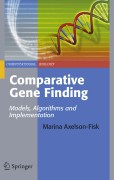
Comparative gene finding: models, algorithms and implementation
Axelson-Fisk, Marina
This unique text/reference describes the state of the art in computational gene finding, with a particular focus on comparative approaches. Providing both an overview of the various methods that are applied in the field, and a concise guide on how computational gene finders are built, the book covers a broad range of topics from probability theory, statistics, information theory, optimization theory and numerical analysis. Features: describes how algorithms and sequence alignments can be combined to improve the accuracy of gene finding; introduces the basic biological terms and concepts in genetics, and provides an historical overview of algorithm development; explores the gene features most commonly captured by a computational gene model; discusses the algorithms mostcommonly used for single-species gene finding; investigates approaches to pairwise and multiple sequence alignments; explains the basics of parameter training; illustrates how to implement a comparative gene finder." This practical guide provides detailed descriptions of the models and algorithms and how to implement them in an easy-to-follow style The book summarizes the advances in the field and gives clear and concise instructions on how to proceed though the project process, enabling readers to be able to construct their own gene finding software INDICE: Introduction.- Single Species Gene Finding.- Sequence Alignment.- Comparative Gene Finding.- Gene Structure Submodels.- Parameter Training.- Implementation of a Comparative Gene Finder.
- ISBN: 978-1-84996-103-5
- Editorial: Springer
- Encuadernacion: Cartoné
- Páginas: 314
- Fecha Publicación: 01/04/2010
- Nº Volúmenes: 1
- Idioma: Inglés
